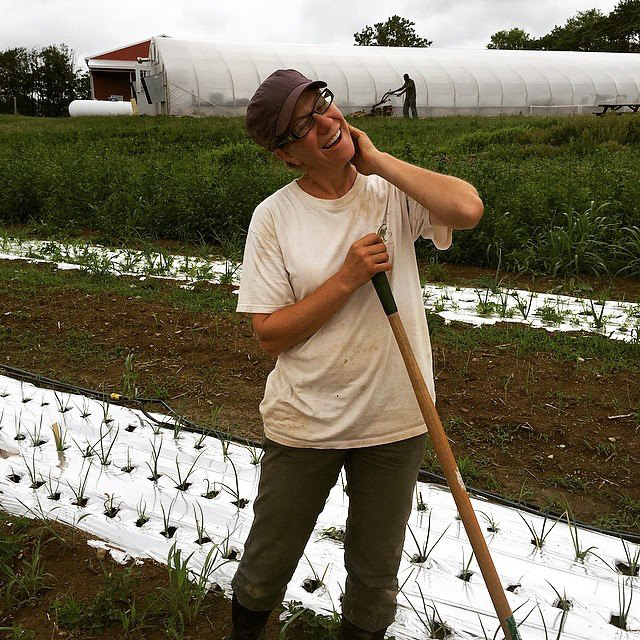When did you know that you wanted to work in food?
In my senior year of college, I took a class on world hunger. Part of the class requirement was to volunteer for a community-based hunger relief organization of our choice, and I chose to help prepare food and serve at a social services center that offered free meals, Amos House. At the same time, I was studying biology and volunteering at a local urban farming organization in Providence, Southside Community Landtrust. So, the circles of food and hunger and environmental issues were starting to intersect for me. Following college I did my first farming internship, and then spent 2+ years as a Peace Corps Volunteer in Madagascar, where I worked on a few different forestry and agricultural projects. When I got home, I realized that I had formed a pretty deep interest, both intellectually and viscerally, in farming, and decided to focus my career with positions that allowed me to get my hands dirty while still getting to teach, write, and think about agriculture.
How did you get your current good food job?
I found it on Good Food Jobs, of course! I had been using a number of the common farming job boards and listserves, and had a few close calls, but then finally found The Seed Farm here. I had some hesitations about up and moving to eastern Pennsylvania, a completely brand new place for me, but I ultimately decided that the job sounded like too good of an opportunity to pass up.
How did your previous work or life experience prepare you for a good food job?
Definitely having worked with a great diversity of people from various backgrounds has helped me immensely. I know it is a bit cliche to say that, but in my case it is absolutely the truth. This is the sixth farm that I have worked on, and certainly, I use techniques, tips, memories and mistakes from these other farms to help me make decisions and respond to issues that come up at The Seed Farm.
What was the greatest obstacle you had to overcome in pursuing your Good Food Job dream?
Job searching is hard! There are so many obstacles, so it is hard to name just one! In my case, I think that sometimes my nerves can get in the way when I am in imposing interview situations. I will never forget the time when I had a phone interview with a panel of over 10 people, and then realized while on the phone that all the other applicants had been invited to come in person for their interview, and mine was the only one on the phone. And the very first question asked had absolutely nothing to do with farming, education, or any of the other key areas of the actual job, and was something about how would I make my position fit into the greater structure of the huge public umbrella organization. I remember coming out of that interview feeling dejected, but also a bit angry and fired up, like "why would you ask such a stupid question? Who would want to work for you anyway? This is so not the right fit!" It helped me realize that as good as a position might sound on paper, you do have to trust your instinct when evaluating different positions, and go with the job that honestly does match you and your goals.
Name one positive thing that a former employer taught you that you continue to appreciate?
I have learned a ton from my former managers, both in what TO do, and what NOT to do. Staying calm and patient as much as humanly possible when dealing with employees or apprentices, especially after a mistake has been made. Offering plenty of positive feedback. Listening to suggestions and honestly weighing them out. Taking responsibility when the buck stops with you. Constantly working to improve communication among team members.
What can you identify as the greatest opportunities in food right now?
For farmers, I think the hottest marketing opportunity is working with institutions like businesses, colleges, and hospitals to organize delivered farm shares to the site of the institution. Some businesses can offer this as an employee benefit, and others are just happy to serve as a delivery point. The traditional CSA and farmers market venues are fairly competitive in a lot of regions, and so new, yet-to-establish farmers need to be creative and patient. Also, collaborating with other food producers, such as bakers, beekeepers, pasta makers, etc. to provide enhanced shares is happening with a lot of success right now.
If you could be compensated for your work with something other than money, what would it be?
This is a great question! As it is, I get free veggies, of course, and at the end of our summer farmers market, I often go around and trade leftover veggies for honey, bread, meat, and more. If we are able to expand the enterprises we are currently doing at The Seed Farm to include fruit, mushrooms, and laying hens, I'd gladly take those products home! I also love visiting other farms and learning from other growers, so if I could have more opportunities for farm walks (that didn't take valuable time away from my already crazy schedule), that would be great!









